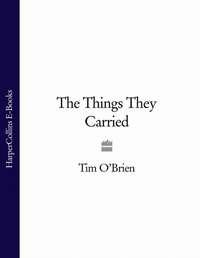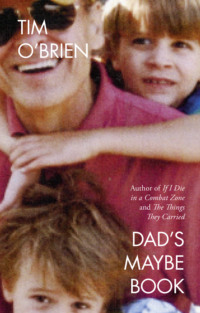
Полная версия
In the Lake of the Woods
4
What He Remembered
Their seventh day at Lake of the Woods passed quietly. There was a telephone but it never rang. There were no newspapers, no reporters or telegrams. Inside the cottage, things had a fragile, hollowed-out quality, a suspended feeling, and over the morning hours a great liquid silence seemed to flow in from the woods and curl up around their bodies. They tried to ignore it; they were cautious with each other. When they spoke, which was not often, it was to maintain the pretense that they were in control of their own lives, that their problems were soluble, that in time the world would become a happier place. Though it required the exercise of tact and willpower, they tried to find comfort in the ordinary motions of life; they simulated their marriage, the old habits and routines. At the breakfast table, over coffee, Kathy jotted down a grocery list. “Caviar,” she said, and John Wade laughed and said, “Truffles, too,” and they exchanged smiles as proof of their courage and resolve. Often, though, the strain was almost impossible to bear. On one occasion, as she was washing the breakfast dishes, Kathy made a low sound in her throat and began to say something, just a word or two, then her eyes focused elsewhere, beyond him, beyond the walls of the cottage, and then after a time she looked down at the dishwater and did not look back again. It was an image that would not go away. Twenty-four hours later, when she was gone, John Wade would remember the enormous distance that had come into her face at that instant, a kind of travel, and he would find himself wondering where she had taken herself, and why, and by what means.
He would never know.
In the days ahead he would look for clues in the clutter of daily detail. The faded blue jeans she wore that morning, her old tennis shoes, her white cotton sweater. The distance in her eyes. The way she rinsed the breakfast dishes and dried her hands and then walked out of the kitchen without looking at him.
What if she’d spoken?
What if she’d leaned against the refrigerator and said, “Let’s do some loving right here,” and what if they had, and what if everything that happened could not have happened because of those other happenings?
Some things he would remember clearly. Other things he would remember only as shadows, or not at all. It was a matter of adhesion. What stuck and what didn’t. He would be quite certain, for instance, that around noon that day they put on their swimsuits and went down to the lake. For more than an hour they lay inert in the sun, half dozing, then later they went swimming until the cold drove them back onto the dock. The afternoon was large and empty. Brilliant patches of red and yellow burned among the pines along the shore, and in the air there was the sharp, dying scent of autumn. There were no boats on the lake, no swimmers or fishermen. To the south, a mile away, the triangular roof of the Forest Service fire tower seemed to float on an expansive green sea; a narrow dirt road cut diagonally through the timber, and beyond the road a trace of gray smoke rose from the Rasmussen cottage off to the west. Northward it was all woods and water.
He would remember a gliding, buoyant feeling in his stomach. The afternoons were always better. Waves and reflections, the big silver lake planing out toward Canada. Not so bad, he was thinking. He watched the sky and pretended he was a winner. Handshakes and happy faces—it made a nice picture. A winner, sure, and so he lay basking in the crisp white sunlight, almost believing.
Later, Kathy nudged him. “Hey there,” she said, “you all right?”
“Perfect,” he said.
“You don’t seem—”
“No, I’m perfect.”
Kathy’s eyes traveled away again. She put on a pair of sunglasses. There was some unfilled time before she said, “John?”
“Oh, Christ,” he said. “Fuck it.”
He would remember a movement at her jaw, a locking motion.
They swam again, taking turns diving from the dock, going deep, then they dried themselves in the sun and walked up to the cottage for a late lunch. Kathy spent the remainder of the afternoon working on a book of crossword puzzles. Wade sat over a pile of bills at the kitchen table. He built up neat stacks in order of priority, slipped rubber bands around them, dropped them in his briefcase.
His eyes ached.
There was that electricity in his blood.
At three o’clock he put in a call to Tony Carbo, who wasn’t available. A half hour later, when he tried again, Tony’s secretary said he’d gone out for the day.
Wade thanked her and hung up.
He unplugged the telephone, carried it into the kitchen, tossed it in a cupboard under the sink.
“Kill Jesus,” he said, which amused him.
Maybe he dozed off. Maybe he had a drink or two. All he would remember with any certainty was that late in the afternoon they locked up the cottage and made the six-mile drive into town. He would remember an odd pressure against his ears—an underwater squeeze. They followed the dirt road west to the Rasmussen cottage, where the road looped north and crossed an iron bridge and turned to loose gravel. Wade would remember giant pines standing flat-up along the roadbed, the branches sometimes vaulting overhead to form shadowed tunnels through the forest. Kathy sat with her hands folded in her lap; after a mile or two she switched on the radio, listened for a moment, then switched it off again. She seemed preoccupied, or nervous, or something in between. If they spoke at all during the ride, he would have no memory of it.
Two miles from town the land began to open up, thinning into brush and scrub pine. The road made a last sharp turn and ran straight west along the shoreline into Angle Inlet. Like a postcard from the moon, Wade thought. They passed Pearson’s Texaco station, a small white schoolhouse, a row of lonely looking houses in need of paint. Somebody’s cat prowled away the afternoon on the post office steps.
Wade parked and went in to pick up the mail. A statement from their accountant, a letter from Kathy’s sister in Minneapolis.
They crossed the street, did the grocery shopping, bought aspirin and booze and tanning lotion, then sat down for coffee at the little sandwich counter in Arndahl’s Mini-Mart. A revolving Coca-Cola clock put the time at 5:12. In nineteen hours, almost exactly, Kathy would be gone, but now the corners of her eyes seemed to relax as she skimmed the letter from her sister. At one point she snorted and made a tossing motion with her head. “Oh, God,” she moaned, then chuckled, then folded the letter and said, “Here we go again.”
“What’s that?”
“Patty. Double trouble, as usual—two boyfriends. Always the juggler.”
Wade nodded at the counter and said, “Good for Patty. More power to her.” There was that sizzle in his blood, the smell of fish and sawdust sweating up from the Mini-Mart floorboards. An aluminum minnow tank near the door gave off a steady bubbling sound.
“Power’s fine,” Kathy said, “but not more men. No kidding, it seems like they always come in pairs—for Patty, I mean. They’re like snakes or politicians or something.” She flicked her eyebrows at him. “That’s a joke.”
“Good one.”
“John—”
“Clever, clever.”
A muscle moved at her cheek. She picked up a glass salt shaker, tapped it against the counter.
“It’s not my fault.”
Wade shrugged. “Sorry.”
“So stop it,” she said. “Just goddamn stop.”
Kathy spun around on her stool, got up, went over to the magazine rack, and stood with her back to him. Dusk was settling in fast. A cold lake breeze slapped up against the Mini-Mart’s screen door, startling the plump young waitress, causing a spill as she refilled their cups.
It was 5:24.
After a time Kathy sat down again and studied the frosted mirror behind the counter, the ads for Pabst and Hamm’s and Bromo-Seltzer. She avoided eye contact, sliding down inside herself, and for an instant, watching her in the mirror, John Wade was assaulted by the ferocity of his own love. A beautiful woman. Her face was tired, with the lax darkening that accompanies age, but still he found much to admire. The green eyes and brown summer skin and slim legs and shapely little fingers. Other things, too—subtle things. The way her hand fit precisely into his. How the sun had turned her hair almost white at the temples. Back in college, he remembered, she used to lie in bed and grasp her own feet like a baby and tell funny stories and giggle and roll around and be happy. All these things and a million more.
Presently, Wade sighed and slipped a dollar bill under his saucer.
“Kath, I am sorry,” he said. “I mean it.”
“Fine, you’re sorry.”
“All right?”
“Sorry, sorry. Never ends.” Kathy waited for the young waitress to scoop up their cups. “Stop blaming me. We lost. That’s the truth—we lost.”
“It was more than that.”
“John, we can’t keep doing this.”
Wade looked at the revolving clock. “Mr. Monster.”
They had a light supper, played backgammon for dimes, sat listening to records in the living room. Around eight o’clock they went out for a short walk. There was a moon and some stars, and the night was windy and cool. The fog had not yet rolled in off the lake. In the coming days John Wade would remember how he reached out to take her hand, the easy lacing of their fingers. But he would also remember how Kathy pulled away after a few steps. She folded her arms across her chest and walked up to the yellow cottage and went inside without waiting for him.
They did not take their blankets to the porch that night. They did not make love. For the rest of the evening they concentrated on backgammon, pushing dimes back and forth across the kitchen table.
At one point he looked up at her and said, “Kath, that stuff in the newspapers—”
Kathy passed him the dice.
“Your move,” she said.
As near as he could remember, they went to bed around eleven. Kathy snapped off the lamp. She turned onto her side and said, “Dream time,” almost cheerfully, as if it did not matter at all that she was now going away.
5
Hypothesis
The purest mystery, of course, but maybe she had a secret lover. Marriages come unraveled. Pressures accumulate. There was precedent in their lives.
In the kitchen that morning, when her eyes traveled away, maybe Kathy Wade was imagining a hotel room in Minneapolis, or in Seattle or Milwaukee, a large clean room with air-conditioning and fresh flowers and no politics and no defeat. Maybe she saw someone waiting for her. Or someone driving north toward Lake of the Woods, moving fast, coming to her rescue. An honest, quiet man. A man without guile or hidden history. Maybe she had grown tired of tricks and trapdoors, a husband she had never known, and later that night, when she said “Dream time,” maybe it was this she meant—an escape dream, a dream she would now enter.
Among the missing, as among the dead, there is only the flux of possibility.
Maybe a heaven, maybe not.
Maybe she couldn’t bear to tell him. Maybe she staged it. Not likely, but not implausible either. The motives were plentiful—fed up, afraid, exhausted by unhappiness. Maybe she woke early the next morning and slipped out of bed and got dressed and moved out to the porch and quietly closed the door behind her and walked up the narrow dirt road to where a car was waiting.
6
Evidence
We called him Sorcerer. It was a nickname.
—Richard Thinbill
Exhibit Seven: Photograph of John Wade, age 12
Smiling
Husky, not fat
Holding a magician’s wand over four white mice
He used to practice down in the basement, just stand in front of that old mirror of his and do tricks for hours and hours. His father didn’t think it was healthy. Always alone, always shut up by himself. A very secretive boy, I think I mentioned that.
—Eleanor K. Wade
Exhibit Eight: John Wade’s Box of Tricks, Partial List
Miser’s Dream
Horn of Plenty
Spirit of the Dark
The Egg Bag
Guillotine of Death
Silks
Pulls
Wands
Wires
Duplicates (6) of father’s necktie
My sister seemed almost scared of him sometimes. I remember this one time when Kathy … Look, I don’t think it’s something we should talk about.
—Patricia S. Hood
What did she so desire escape from? Such a captive maiden, having plenty of time to think, soon realizes that her tower, its height and architecture, are like her ego only incidental: that what really keeps her where she is is magic, anonymous and malignant, visited on her from outside and for no reason at all.
Having no apparatus except gut fear and female cunning to examine this formless magic, to understand how it works, how to measure its field strength, count its line of force, she may fall back on superstition or take up a useless hobby like embroidery, or go mad, or marry a disk jockey. If the tower is everywhere and the knight of deliverance no proof against its magic, what else?12
—Thomas Pynchon (The Crying of Lot 49)
To study psychological trauma is to come face to face both with human vulnerability in the natural world and with the capacity for evil in human nature.13
—Judith Herman (Trauma and Recovery)
There is no such thing as “getting used to combat” … Each moment of combat imposes a strain so great that men will break down in direct relation to the intensity and duration of their exposure. Thus psychiatric casualties are as inevitable as gunshot and shrapnel wounds in warfare.14
—J. W. Appel and G. W. Beebe (Professors of Psychiatry)
It wasn’t just the war that made him what he was. That’s too easy. It was everything—his whole nature… But I can’t stress enough that he was always very well behaved, always thoughtful toward others, a nice boy. At the funeral he just couldn’t help it. I wanted to yell, too. Even now I’ll go out to my husband’s grave and stare at that stupid stone and yell Why, why, why!
—Eleanor K. Wade
You know, I think politics and magic were almost the same thing for him. Transformations—that’s part of it—trying to change things. When you think about it, magicians and politicians are basically control freaks. [Laughter] I should know, right?
—Anthony L. (Tony) Carbo
The capacity to appear to do what is manifestly impossible will give you a considerable feeling of personal power and can help make you a fascinating and amusing personality.15
—Robert Parrish (The Magician’s Handbook)
Pouring out affection, [Lyndon Johnson] asked—over and over, in every letter, in fact, that survives—that the affection be reciprocated.16
—Robert A. Caro (The Years of Lyndon Johnson)
There surely never lived a man with whom love was a more critical matter than it is with me.17
—Woodrow Wilson
When his father died, John hardly even cried, but he seemed very, very angry. I can’t blame him. I was angry, too. I mean—you know—I kept asking myself, Why? It didn’t make sense. His father had problems with alcohol, that’s true, but there was something else beneath it, like this huge sadness I never understood. The sadness caused the drinking, not the other way around. I think that’s why his father ended up going into the garage that day … Anyway, John didn’t cry much. He threw a few tantrums, I remember that. Yelling and so on. At the funeral. Awfully loud yelling.
—Eleanor K. Wade
After a traumatic experience, the human system of self-preservation seems to go onto permanent alert, as if the danger might return at any moment. Physiological arousal continues unabated.18
—Judith Herman (Trauma and Recovery)
It wasn’t insomnia exactly. John could fall asleep at the drop of a hat, but then, bang, he’d wake up after ten or twenty minutes. He couldn’t stay asleep. It was as if he were on guard against something, tensed up, waiting for … well, I don’t know what.
—Eleanor K. Wade
Sometimes I am a bit ashamed of myself when I think how few friends I have amidst a host of acquaintances. Plenty of people offer me their friendship; but, partly because I am reserved and shy, and partly because I am fastidious and have a narrow, uncatholic taste in friends, I reject the offer in almost every case; and then am dismayed to look about and see how few persons in the world stand near me and know me as I am.19
—Woodrow Wilson
Show me a politician, I’ll show you an unhappy childhood. Same for magicians.
—Anthony L. (Tony) Carbo
My mother was a saint.20
—Richard M. Nixon
I remember Kathy telling me how he’d wake up screaming sometimes. Foul language, which I won’t repeat. In fact, I’d rather not say anything at all.
—Patricia S. Hood
For some reason Mr. Wade threw away that old iron teakettle. I fished it out of the trash myself. I mean, it was a perfectly good teakettle.
—Ruth Rasmussen
The fucker did something ugly.
—Vincent R. (Vinny) Pearson
Vinny’s the theory man. I deal in facts. The case is wide open.21
—Arthur J. Lux (Sheriff, Lake of the Woods County)
12. Thomas Pynchon, The Crying of Lot 49 (1965; reprint, New York: Perennial Library, 1990), pp. 21–22.
13. Judith Herman, Trauma and Recovery (New York: Basic Books, 1992), p. 7.
14. J. W. Appel and G. W. Beebe, “Preventive Psychiatry: An Epidemiological Approach,” Journal of the American Medical Association 131 (1946), p. 1470.
15. Robert Parrish, The Magician’s Handbook (New York: Thomas Yoseloff, 1944), p. 10.
16. Robert A. Caro, The Years of Lyndon Johnson: The Path to Power (New York: Alfred A. Knopf, 1982), p. 228.
17. Woodrow Wilson, in Richard Hofstadter, The American Political Tradition (1948; reprint, New York: Vintage Books, 1989), p. 310.
18. Herman, Trauma and Recovery, p. 35.
19. Woodrow Wilson, in Hofstadter, The American Political Tradition, pp. 310–311.
20. Richard M. Nixon, The Memoirs of Richard Nixon (New York: Grosset and Dunlap, 1978), p. 1088.
21. Yes, and I’m a theory man too. Biographer, historian, medium—call me what you want—but even after four years of hard labor I’m left with little more than supposition and possibility. John Wade was a magician; he did not give away many tricks. Moreover, there are certain mysteries that weave through life itself, human motive and human desire. Even much of what might appear to be fact in this narrative—action, word, thought—must ultimately be viewed as a diligent but still imaginative reconstruction of events. I have tried, of course, to be faithful to the evidence. Yet evidence is not truth. It is only evident. In any case, Kathy Wade is forever missing, and if you require solutions, you will have to look beyond these pages. Or read a different book.
7
The Nature of Marriage
When he was a boy, John Wade’s hobby was magic. In the basement, where he practiced in front of a stand-up mirror, he made his mother’s silk scarves change color. He cut his father’s best tie with scissors and restored it whole. He placed a penny in the palm of his hand, made his hand into a fist, made the penny into a white mouse.
This was not true magic. It was trickery. But John Wade sometimes pretended otherwise, because he was a kid then, and because pretending was the thrill of magic, and because for a while what seemed to happen became a happening in itself. He was a dreamer. He liked watching his hands in the mirror, imagining how someday he would perform much grander magic, tigers becoming giraffes, beautiful girls levitating like angels in the high yellow spotlights—naked maybe, no wires or strings, just floating there.
At fourteen, when his father died, John did the tricks in his mind. He’d lie in bed at night, imagining a big blue door, and after a time the door would open and his father would walk in, take off his hat, and sit in a rocking chair beside the bed. “Well, I’m back,” his father would say, “but don’t tell your mom, she’d kill me.” He’d wink and grin. “So what’s new?”
And then they’d talk for a while, quietly, catching up on things, like cutting a tie and restoring it whole.
He met Kathy in the autumn of 1966. He was a senior at the University of Minnesota, she was a freshman. The trick then was to make her love him and never stop.
The urgency came from fear, mostly; he didn’t want to lose her. Sometimes he’d jerk awake at night, dreaming she’d left him, but when he tried to explain this to her, Kathy laughed and told him to cut it out, she’d never leave, and in any case thinking that way was destructive, it was negative and unhealthy. “Here I am,” she said, “and I’m not going anywhere.”
John thought it over for several days. “Well, all right,” he said, “but it still worries me. Things go wrong. Things don’t always last.”
“We’re not things,” Kathy said.
“But it can happen.”
“Not with us.”
John shrugged and looked away. He was picturing his father’s big white casket. “Maybe so,” he said, “but how do we know? People lose each other.”
In early November he began spying on her. He felt some guilt at first, which bothered him, but he also found satisfaction in it. Like magic, he thought—a quick, powerful rush. He knew things he shouldn’t know. Intimate little items: what she ate for breakfast, the occasional cigarette she smoked. Finesse and deception, those were his specialties, and the spying came easily. In the evenings he’d station himself outside her dormitory, staring up at the light in her room. Later, when the light went off, he’d track her to the student union or the library or wherever else she went The issue wasn’t trust or distrust. The whole world worked by subterfuge and the will to believe. And so he’d sometimes make dates with her, and then cancel, and then wait to see how she used the time. He looked for signs of betrayal: the way she smiled at people, the way she carried herself around other men. In a way, almost, he loved her best when he was spying; it opened up a hidden world, new angles and new perspectives, new things to admire. On Thursday afternoons he’d stake out women’s basketball practice, watching from under the bleachers, taking note of her energy and enthusiasm and slim brown legs. As an athlete, he decided, Kathy wasn’t much, but he got a kick out of the little dance she’d do whenever a free throw dropped in. She had a competitive spirit that made him proud. She was a knockout in gym shorts.
Down inside, of course, John realized that the spying wasn’t proper, yet he couldn’t bring himself to stop. In part, he thought, Kathy had brought it on herself: she had a personality that lured him on. Fiercely private, fiercely independent. They’d be at a movie together, or at a party, and she’d simply vanish; she’d go out for a pack of gum and forget to return. It wasn’t thoughtlessness, really, but it wasn’t thoughtful either. Without reason, usually without warning, she’d wander away while they were browsing in a shop or bookstore, and then a moment later, when he glanced up, she’d be cleanly and purely gone, as if plucked off the planet. That fast—here, then gone—and he wouldn’t see her again for hours, or until he found her holed up in a back carrel of the library. All this put a sharp chill in his heart. He understood her need to be alone, to reserve time for herself, but too often she carried things to an extreme that made him wonder. The spying helped. No great discoveries, but at least he knew the score.






